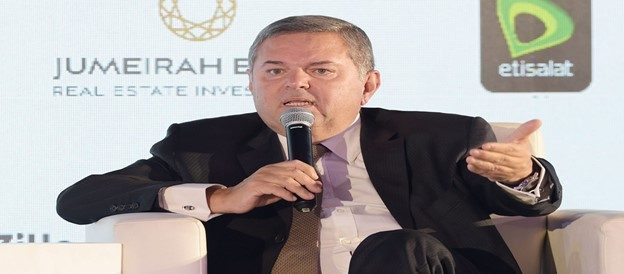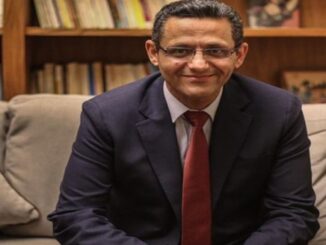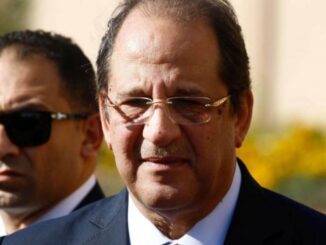
The Egyptian Minister of Public Enterprise Sector says his ministry has established a company in cooperation with a sovereign body, with the aim of building 3,000 charging stations for electric vehicles.
In a speech at the 7th CEO Conference, organized by Al Mal GTM on Sunday, Public Enterprise Minister Hisham Tawfik said a company has been established in cooperation with a sovereign body to build 3,000 electric vehicle (EV) charging stations for .
Hisham Tawfik, Minister of Public Enterprise Sector, announced on Sunday 5 December 2021 establishment of a company in cooperation with a sovereign body to build 3,000 charging stations for electric cars, in 3 governorates as a first phase of a plan to build 42,000 charging stations in Egypt during the coming period, as part of the state’s plan to localize the electric vehicle industry in the country.
During his speech at the Seventh CEO Conference, organized by Al Mal GTM, , a private sector think tank for economic and political reform policies, on Sunday, Tawfik said that the structure of the new company is distributed by 90% for the participating sovereign body and 10% for Al Nasr Automotive Company.
Tawfik pointed out that there is cooperation with the Ministry of Electricity in this regard, and that the price was set by the Cabinet, which is an appropriate and competitive price.
The Council of Ministers set the prices for supplying electricity to the commercial car charging stations (22 kilowatts) , and to stations that pay for use, and to the AC and DC 50 kilowatt stations, at EGP 1.21 per kilowatt.
However, the price for consumers at the commercial car charging stations (22 kilowatts) is EGP 1.69 per kilowatt, 169 piasters per kilowatt for the consumer.
As for stations that pay for the use the price for consumers is EGP 1.89 per kilowatt.
Finally, at the DC 50 kW stations, the price of charging electric cars for consumers is EGP 3.75 per kilowatt.
Electric cars (E70)
In June 2021, Minister of Public Enterprise Hisham Tawfik said Egypt will manufacture the electric cars (E70) next year, with expected production capacity to reach 50,000 cars per year.
In TV statements, Minister Tawfik then said that Egypt has put 12 electric cars into trial for 30,000 km.
“The first 100 electric cars will be produced in August 2022, where cars will be of single motor and three different batteries,” he added.
He further signaled that the cars to be produced will be private, taxis and for trade purposes.
“The country will build 3,000 charging stations for electric cars, where 6,000 cars ca be charged at the same time,” Minister Tawfik said. “Half of the number of the stations will be near homes or work places.”
Citizens can start registering to buy the new Nasr electric car (E70) starting from December, after the electric cars will be tested during the coming period.
As many as 13 cars were imported, of which nine cars will be tested in Egypt by drivers from Uber company, he added.
Minister of Public Enterprise Sector Hisham Tawfik in June attended a conference to launch E70 electric cars, which would be manufactured in Egypt as of mid-2022.
Sovereign bodies, armed forces
Usually, the phrase “sovereign bodies” in Egypt refers to the intelligence and security services and sometimes the armed forces. In this context, Tawfik’s statement that “the structure of the new company is distributed by 90% for the participating sovereign body and 10% for Al Nasr Automotive Company’ boosts the idea of the domination of the armed forces and sovereign bodies on the Egyptian economy.
In fact, the military is woven into almost every part of Egypt’s economy. It runs businesses, produces goods, and manages huge infrastructure projects, states Yezid Sayigh, a senior fellow at the Carnegie Middle East Center in Beirut, in a paper published by Carnegie.
For decades, the Egyptian military has been allowed to engage in economic activities as a way of reducing the official defense budget; doing this allows them to shift some costs to other areas so they won’t appear in the defense budget.
The military economy is also a way of compensating senior officers for low pay and pensions by giving them the opportunity to acquire extra incomes and fringe benefits. The overall volume of this economic activity was relatively modest until 2011, when then Egyptian president Hosni Mubarak was forced out of power.
Since 2013, when the military took power, the military economy has transformed. This is because President Abdel Fattah el-Sisi, a former general who became president in 2014, has relied on the military to take over major management roles in the civilian economy. It has effectively replaced the government in awarding contracts and managing the crash program of civilian housing and public infrastructure that the government has been funding for the past four or five years.
The military also helps provide civilian markets with affordable goods, including food, and raises revenue for the state treasury. Yet by relying on the military to compensate for the failings of civilian agencies to manage the economy, public infrastructure, and markets, the government further weakens and marginalizes those same agencies. That racks up problems for the future.
Additionally, this approach overlooks the real structural problems of the Egyptian economy. These have to do with low productivity, low investment in all sectors except for energy and real estate, and low value added, especially in technology-dependent sectors.
The Egyptian military has been involved in infrastructure for decades, and it’s a good example of the nature and extent of its activity.
For a long while, this was relatively modest. The military started by working on land reclamation, that is, turning deserts into arable land. In the late 1970s, the army led the way in reconstructing cities and infrastructure along the Suez Canal that had been damaged severely during the war with Israel. But with that exception, its overall contribution to public infrastructure was fairly limited until 2011, when the revolution ousted Mubarak.
Since then, there’s been a major shift. The military now manages approximately one-quarter of total government spending in housing and public infrastructure. That’s about 370 billion Egyptian pounds, which is, at today’s rate, something like $24 billion—which might not seem like a lot compared to government budgets in the United States or Europe—but in Egypt, it’s a great deal of money.
This is partly why the Egyptian government is now severely indebted. It gives a sense of the scale of the military’s work compared to overall government expenditure on public infrastructure.
Until the military’s takeover in 2013, its economic activity functioned to keep the senior officer corps happy and loyal to the president, by allowing them perks.
Sisi, however, has a different calculation. He is looking to reinforce the political legitimacy of his regime domestically and to show Western governments and foreign investors that Egypt means business. He wants to demonstrate credibility. He’s shown his contempt openly for the civilian agencies of his own state. He feels he can only trust the military to do the job on time, within budget, says Yezid Sayigh.



